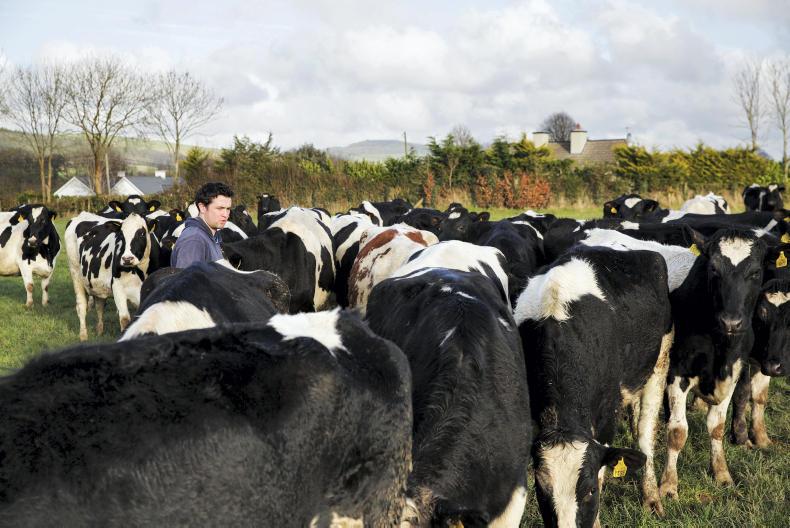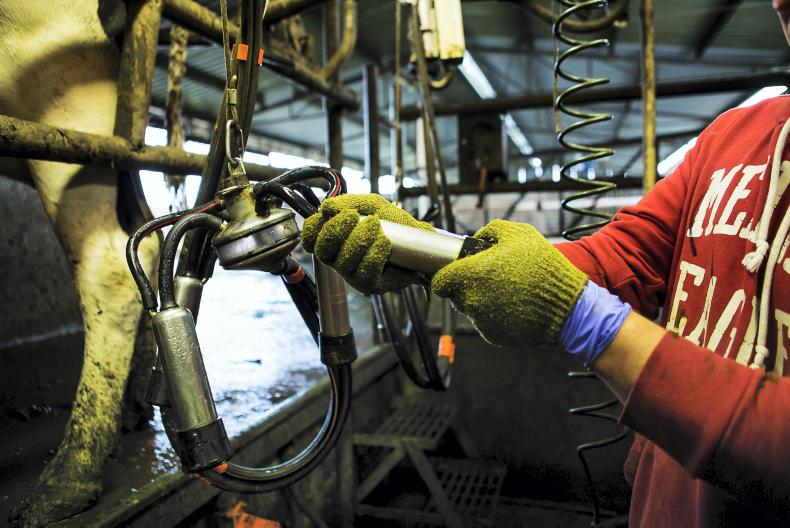There are two sides to the farm labour story. On one side there is a tale of crisis with the numbers that the Teagasc People in Dairy Farming Project state will be required over the next few years. On the other is a tale of opportunity to work on farms in rural Ireland.
The past and projected rise in dairy cow numbers means a lot more help will be required on some farms. The report released last week by the Teagasc group brings the spotlight once again on a sector that is undergoing significant change.
Dairy herd sizes are rapidly increasing and family labour is less and less a part of the solution on many farms. The fact that over 50% of Irish cows are milked in herds with more than 100 cows is a sure sign of the direction of travel for dairy farmers. For many, foreign workers, machinery contractors and short-term students are filling the gap. However, long-term dependence on such labour sources is not sustainable.
The beauty of the Teagasc report is that it highlights the opportunity and puts real figures on the changing face of dairy farming in Ireland. Many of the workers crammed into white vans on the road to Dublin every morning would prefer and would probably be better off working on dairy farms. For many, it would bring security, an opportunity to help out with family and a lot less time spent sitting in traffic.
There is an onus on farmers as employers to promote this opportunity. Employees need proper structures put in place (start and finishing times), set hours per week, rotas, holidays, payroll management, etc. The days of starting at 6am and working until dusk and expecting employees to do the same seven days a week are long gone. Many owner-operators decide to do this and by all means if that is their wish, they are free to do so, but employees have other aims and responsibilities.
There is an onus on the Government to provide tax breaks and social welfare options that might allow people (some of whom may be in receipt of benefits) work with dairy farmers who have employment opportunities. People won’t grasp these opportunities unless it is worthwhile. They will not risk losing existing social welfare aid to work hard for a neighbour and lose a significant amount in tax. Any incentive, even short-term, would allow farmers to showcase the opportunities that exist and build a bridge between those who are looking for work and those who have it.
For farmers, there is also a very real on-farm investment solution for reducing labour on dairy farms. Proper basic facilities – a good crush, efficient handling and milking equipment, and proper calf-feeding facilities – can all make dairy management much more efficient.
Teagasc, as the leading authority on research and education, has a very clear responsibility. One-off conferences or random training programmes are of little benefit. We need sustained investment in fully developed support programmes for employees and employers with ambitious targets for numbers of people that will be trained through this programme.
Currently, prospective dairy managers who have come back to farming from other careers are completing part-time agricultural education to tick a box for compliance reasons. Many get disillusioned and there is a need for more focus and specific programme delivery for those aiming to go full-time farming as compared to those completing distance education for other reasons.
Likewise, every farmer employing anyone should have the option of completing a HR course to develop the required management skills – something with which most farmers have very little prior experience.
The beauty of this crisis or opportunity is we have many potential solutions at our fingertips. All we need now is a concerted industry effort to coordinate a list of actions and hold all those responsible to account. Minister Creed and the Department need to take the lead and set the wheels in motion to deliver long-term solutions for farmers and rural Ireland.
Read more
Listen: 6,000 dairy workers wanted
What type of dairy workers are required in Ireland?
Foreign labour and intensive courses to help meet jobs demand
Farmer reactions to Teagasc report
Farmer Writes: dairy farming isn't all dirty elbows and 12-hour days
The legalities around hiring foreign labour
There are two sides to the farm labour story. On one side there is a tale of crisis with the numbers that the Teagasc People in Dairy Farming Project state will be required over the next few years. On the other is a tale of opportunity to work on farms in rural Ireland.
The past and projected rise in dairy cow numbers means a lot more help will be required on some farms. The report released last week by the Teagasc group brings the spotlight once again on a sector that is undergoing significant change.
Dairy herd sizes are rapidly increasing and family labour is less and less a part of the solution on many farms. The fact that over 50% of Irish cows are milked in herds with more than 100 cows is a sure sign of the direction of travel for dairy farmers. For many, foreign workers, machinery contractors and short-term students are filling the gap. However, long-term dependence on such labour sources is not sustainable.
The beauty of the Teagasc report is that it highlights the opportunity and puts real figures on the changing face of dairy farming in Ireland. Many of the workers crammed into white vans on the road to Dublin every morning would prefer and would probably be better off working on dairy farms. For many, it would bring security, an opportunity to help out with family and a lot less time spent sitting in traffic.
There is an onus on farmers as employers to promote this opportunity. Employees need proper structures put in place (start and finishing times), set hours per week, rotas, holidays, payroll management, etc. The days of starting at 6am and working until dusk and expecting employees to do the same seven days a week are long gone. Many owner-operators decide to do this and by all means if that is their wish, they are free to do so, but employees have other aims and responsibilities.
There is an onus on the Government to provide tax breaks and social welfare options that might allow people (some of whom may be in receipt of benefits) work with dairy farmers who have employment opportunities. People won’t grasp these opportunities unless it is worthwhile. They will not risk losing existing social welfare aid to work hard for a neighbour and lose a significant amount in tax. Any incentive, even short-term, would allow farmers to showcase the opportunities that exist and build a bridge between those who are looking for work and those who have it.
For farmers, there is also a very real on-farm investment solution for reducing labour on dairy farms. Proper basic facilities – a good crush, efficient handling and milking equipment, and proper calf-feeding facilities – can all make dairy management much more efficient.
Teagasc, as the leading authority on research and education, has a very clear responsibility. One-off conferences or random training programmes are of little benefit. We need sustained investment in fully developed support programmes for employees and employers with ambitious targets for numbers of people that will be trained through this programme.
Currently, prospective dairy managers who have come back to farming from other careers are completing part-time agricultural education to tick a box for compliance reasons. Many get disillusioned and there is a need for more focus and specific programme delivery for those aiming to go full-time farming as compared to those completing distance education for other reasons.
Likewise, every farmer employing anyone should have the option of completing a HR course to develop the required management skills – something with which most farmers have very little prior experience.
The beauty of this crisis or opportunity is we have many potential solutions at our fingertips. All we need now is a concerted industry effort to coordinate a list of actions and hold all those responsible to account. Minister Creed and the Department need to take the lead and set the wheels in motion to deliver long-term solutions for farmers and rural Ireland.
Read more
Listen: 6,000 dairy workers wanted
What type of dairy workers are required in Ireland?
Foreign labour and intensive courses to help meet jobs demand
Farmer reactions to Teagasc report
Farmer Writes: dairy farming isn't all dirty elbows and 12-hour days
The legalities around hiring foreign labour









SHARING OPTIONS